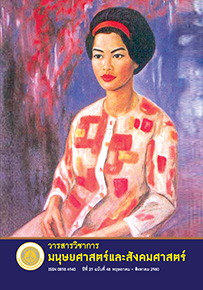ผญาภาษิต: ทุนทางสังคมและวัฒนธรรมสกลนคร Paya Pasit: Cultural and Social Capital of Sakon Nakorn
Main Article Content
Abstract
บทคัดย่อ
ผญาภาษิตเป็นสำนวนภาษาท้องถิ่นที่ปราชญ์ชาวอีสานได้สร้างขึ้นเพื่อเป็นคำสอนอบรมลูกหลาน ขัดเกลาจิตใจให้มีแนวทางในการประพฤติปฏิบัติตนให้ถูกต้องและเป็นคนดี เนื้อหาของผญาภาษิตจึงแฝงด้วยแง่คิดที่มีสาระเชิงคติธรรมคำสอนมีความสัมพันธ์ต่อวิถีชีวิตของชาวอีสานโดยทั่วไป จังหวัดสกลนครเป็นจังหวัดที่มีอิทธิพลความเชื่อของพุทธศาสนามีบทบาทต่อการดำรงอยู่ของชาวบ้านอย่างยิ่ง เนื่องจากชาวสกลนครมีวัฒนธรรม จารีตและประเพณีที่ล้วนเกิดจากการนับถือพุทธศาสนาดังเช่นการปฏิบัติตนตามฮีตสิบสองคองสิบสี่เป็นต้นผญาภาษิตเป็นส่วนหนึ่งของเครื่องมือทางภาษาที่มีเนื้อหาสะท้อนภูมิปัญญาท้องถิ่น แนวคิดทางพุทธธรรมตลอดจนจารีตประเพณีของชาวอีสานตามวิถีแห่งพุทธศาสนาที่สืบทอดมา การที่ชาวสกลนครมีผญาภาษิตนับว่ามีทุนทางสังคมและวัฒนธรรมเป็นบรรทัดฐานในการดำรงชีวิตซึ่งก่อให้เกิดความสงบสุขในสังคม การที่ปัจจุบันมีการเปลี่ยนแปลงสภาพสังคมและเศรษฐกิจทำให้ผญาภาษิตลดบทบาทลงจนใกล้จะสูญหายจึงเป็นสิ่งที่สมควรอนุรักษ์และสืบทอดต่อไป
Abstract
Paya Pasit is a native epigram or idiom of local Isan philosophers for teaching and guiding younger generations to behave well and appropriately. The contents of the Paya Pasit are related to Isan people’s way of life in terms of ethics and morale. Since Buddhism has a great impact on people’s way of life in Sakon Nakhorn Province, culture, custom, and tradition in Sakon Nakhorn Province are Buddhism-related.
As a consequence, Paya Pasit is one of lingual tools reflecting Isan people’s custom and tradition which comply with Buddhist belief. Paya Pasit can be considered as both cultural and social capital of Sakon Nakhorn Province and it is a norm for peaceful living. With economic and social changes, Paya Pasit is endangered, furthermore preservation is urgently needed before it is extinct.
Downloads
Article Details
บทความทุกบทความเป็นลิขสิทธิ์ของวารสารวิชาการมนุษยศาสตร์และสังคมศาสตร์ มหาวิทยาลัยบูรพาเท่านั้น


